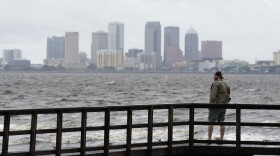-
Scientists warn that a proposed expansion of Port Everglades could cause unprecedented damage to corals in the U.S., including some of the only remaining endangered staghorn corals that survived a record-breaking heat wave.
-
Hurricane Melissa grew into one of the most powerful Atlantic tropical cyclones in recorded history on Oct. 28, 2025, hitting western Jamaica with 185 mph sustained winds. The Category 5 hurricane blew roofs off buildings and knocked down power lines, its torrential rainfall generated mudslides and flash flooding, and its storm surge inundated coastal areas.
-
Weather experts said they feared that if forecasts become less accurate, the public will lose faith in them — and the result will be that residents will be less likely to heed hurricane warnings and evacuate when their lives may be in danger.
-
As budget cuts loom for the National Oceanic and Atmospheric Administration, the Environmental Defense Fund create a new map providing the location and explanation of work done by hundreds of NOAA offices and research projects across the country.
-
A cluster of space weather satellites has blasted off to cast fresh eyes on solar storms. The three satellites belonging to NASA and the National Oceanic and Atmospheric Administration soared from Florida on Wednesday morning on the same SpaceX rocket. They're aiming for a sun-orbiting lookout 1 million miles from Earth, each on its own separate mission.
-
Fisheries scientist Holden Harris reflects on being fired from NOAA and what the loss of public science means for our oceans, our climate, and our future.
-
The federal forecasting agency plans to restore some of its losses from this year’s Trump administration cuts.
-
South Florida weather experts and members of congress are sounding the alarm over a proposed $2.2 billion dollar cut to the National Oceanic and Atmospheric Administration (NOAA) under President Trump's 2026 fiscal year budget.
-
The National Oceanic and Atmospheric Administration said Monday it is delaying by one month the planned cutoff of satellite data that helps forecasters track hurricanes.
-
The National Hurricane Center says Tropical Storm Andrea has formed in the Atlantic Ocean. It is the first tropical storm of the Atlantic hurricane season.
-
Accuracy will be crucial again in 2025, as meteorologists predict another active Atlantic hurricane season, yet cuts in staffing and threats to funding at NOAA are diminishing operations that forecasters rely on.
-
In the preseason outlook issued Thursday, forecasters say warm ocean temperatures are the main reason the season is again expected to busier than normal. ”Everything's in place for an above-average season,” said National Weather Service Director Ken Graham, ”No matter the forecast, what do we always say? It only takes one. So we gotta be prepared.”
Play Live Radio
Next Up:
0:00
0:00
Available On Air Stations












